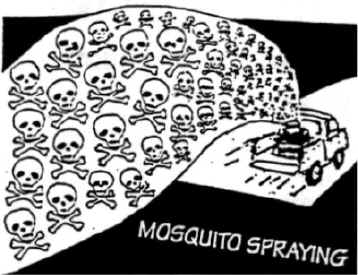 |
No Spray News James Irwin |
 |
No Spray News James Irwin |
March 11, 2002 Page 1
Meet Your Tiger Mosquito It's almost impossible to overstate how predominant this mosquito is in the Columbia area. Except for short periods after infrequent flood events due to tropical storm remnants, this is about the only mosquito I run into in my yard. in my night-time forays around the Columbia area, I have also found few mosquitoes of other species. The New Bug on the Block Charleston ovitrap data reveal that the tiger mosquito's arrival (from Asia) in 1991 fueled a 1000% increase in the container mosquito population, with other container mosquitoes disappearing in the process. Know Your Enemy The tiger mosquito does not fly in from swamps. It will not even breed in a nearby ditch. It is an obligate container mosquito, which means that it lays its eggs, and grows up into an adult mosquito, only in water-filled above-ground containers. Control the containers, and you control this mosquito. A Local Problem While other mosquitoes' flight ranges are expressed in miles, the tiger mosquito usually doesn't stray more than 100-200 yards from its birthplace. So if you have tiger mosquitoes in your yard, the source cannot be far away. |
What Are We Spraying For? Neither the city of Columbia nor Richland County claims to be spraying for the tiger mosquito. The city of Columbia sprays different areas of the city on a rotating basis, without regard to numbers.of those mosquito species it does claim to be spraying for. Columbia mosquito control officials pay so little attention to actual mosquitoes that one of the two mosquito species they claimed to be spraying for in 1997 had actually been gone from Columbia for 5 years (since the arrival of the tiger mosquito). The other species they claimed to be spraying for, Culex quinquefasciatus, is notorious for developing resistance to malathion, the insecticide that the city (and the county) sprays. County Sprays Anyway While Richland County claims its spraying is based largely on the results of its light trap monitoring, a sample of county light trap data (June through Sept. 1998) revealed that Richland County on 30 ocassions during this period sprayed areas where its own light trap data showed that mosquitoes were below nuisance levels. (Note: the tiger mosquito does not show up in light traps.) On another 28 occasions during this period, Richland County sprayed areas without any light trap data. |
HOW EFFECTIVE IS MOSQUITO SPRAYING? Let's do the math But spraying is not perfect. Estimates of susceptible mosquitoes killed by residential spraying (based on light trap data)vary from 15% (Gainesville FL) to 30% (Houston TX). Using these estimates would produce a mortality rate 1.5% to 3% of the mosquitoes sprayed here. However, these estimates are based on evening spraying, not on our less effective middle-of-the-night spraying. Making this adjustment drops the percentage of sprayed mosquitoes killed here to 0.75% to 1.5%. But looking at the percentage of sprayed mosquitoes killed overstates the effectiveness of mosquito spraying, which is better measured by the percent reduction in total mosquito-days. (After all, a mosquito which dies from insecti- cide spray after pestering you for a week is not the same as a mosquito that was never there.) Spraying that kills 0.75%-1.5% of the mosquitoes will result in a reduction of about 0.3% to 0.6% in total mosquito-days. Our estimate of the effectiveness of our local mosquito spraying programs is now in truly microscopic territory, and we still haven't allowed for the very real possibility that some of the mosquito species that Columbia and Richland County spray for have developed resistance to to the insecticde used here. Is this worth the risks and problems that mosquito spraying entails?? |